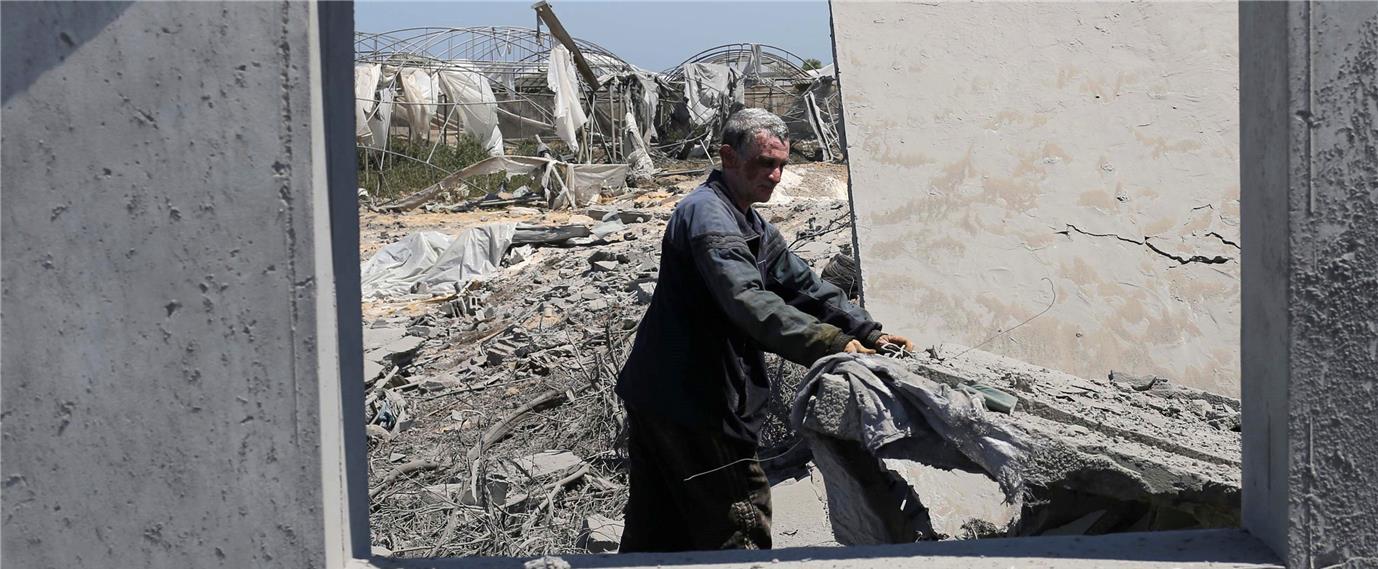استطاعت الصحفية الفلسطينية هاجر حرب عبر تحقيق استقصائي أعدّته مؤخراً، أن تكشف فساداً طال المنحة العُمانية المخصَّصة لإعمار وترميم عدد من المنازل المدمَّرة في قطاع غزة، وأثبتت تورط مسؤولين في وزارة التنميَّة الاجتماعية في منح عددٍ من المنازل المقدَّمة من المنحة العُمانية لغير مستحقيها.
ونال تحقيق "مساكن الغلابة" الذي بُثَ عبر فضائية "النجاح" المحلية تفاعلاً كبيراً من قبل أهالي القطاع ورواد مواقع التواصل الاجتماعي، إذ طالبوا على إثره بمحاسبة كافة المتورطين في هذه القضية.
عملت هاجر في مجال الصحافة الاستقصائية منذ العام 2015، وأنجزت ثلاثة تحقيقات مصورة ومكتوبة، في حين كشف تحقيقها الأول فساداً في مستشفيات حكومية في القطاع، تعرّضت على أثره للملاحقة القانونية والأمنية من قِبل الحكومة الفلسطينية في القطاع، وحُكم عليها بالسَّجن غيابياً أثناء سفرها للعلاج في الخارج.
ملاحقة قانونية وأمنية
لم تلتفت هاجر إلى المضايقات التي تعرضت لها، ولا حتى ملاحقتها القانونية والأمنية، "واصلتُ العمل على إعداد مزيد من التحقيقات لكشف ملفات الفساد، فأنا ارتضيت العمل في هذا المجال، ويجب أن أكمل المشوار لمكافحة الفساد وكشف الحقائق".
الصحافة الاستقصائية في قطاع غزة تواجه عراقيل وتحديات بحسب حرب، لكونها أداة جديدة فرضت نفسها بقوة بين الصحفيين. ورغم ذلك، استطاعوا إنجاز عدد كبير من التحقيقات الاستقصائية، مظهرين الوجه الحقيقي للصحافة باعتبارها سلطة رابعة، ومدى تأثيرها على المجتمع.
وتتلخص التحديات في تعرض الصحفيين للملاحقة الأمنية، وعدم وجود قانون يحمي المُبلِّغين عن الفساد، إضافة إلى غياب القوانين الخاصة بقانون حق الحصول على المعلومات والوثائق لكون التحقيقات تحتاج إلى كم كبير من المعلومات، "فنحن نواجه عراقيل من بعض المصادر التي ترفض التعاطي مع الصحفيين، ولهذا السبب تأخذ التحقيقات وقتاً طويلاً لإنجازها، إضافة إلى افتقار الصحفيين الاستقصائيين في غزة إلى كثير من الأدوات المساعدة في العمل الاستقصائي".
تطوير بيئة الاستقصاء
تدعو حرب إلى اتخاذ عدد من الخطوات لتطوير بيئة الاستقصاء في قطاع غزة، ومنها تعديل القوانين ذات العلاقة بالصحافة الاستقصائية، وحماية الصحفيين الاستقصائيين وحماية مصادرهم الخاصة، وسن قوانين خاصة بهم.
كما تدعو الجامعات الفلسطينية إلى تدريس الصحافة الاستقصائية، والتركيز على الجانب العملي، وأن يكون هناك توجه حقيقي لدى العاملين في مجال الصحافة الاستقصائية للكشف عن الفساد، فلا يكون هدفهم البحث عن الشهرة، بالإضافة إلى الاستفادة من التجارب الدولية والعربية في مجال الاستقصاء، وفهمها ودراستها جيداً لمعرفة كيفية تقديم نموذج متقدم في الصحافة الاستقصائية.
من جهته، تناول الصحفي محمود هنية الصيد الممنوع في حوض ميناء غزة البحري، الذي يحتوي كمية كبيرة وعالية جداً من التلوث والمواد المعدنية الخطرة.
وأظهر التحقيق أن الشرطة البحرية هي من تتولى عملية الصيد بالتنسيق مع الصيادين مقابل عائد مالي. وعلى إثر نشر التحقيق، تم تشكيل لجنة تقصٍّ برلمانية من المجلس التشريعي، وباشرت عملها في غضون شهر، وأجرت العديد من التحقيقات المنفصلة مع الصيادين والجهات ذات العلاقة، وأثبتت الحقائق الواردة في التحقيق، وأوصت بإحالة مسؤولي جهاز البحرية الفلسطينية إلى التحقيق القضائي.
وقد فاز تحقيق هنية بجائزة أفضل تحقيق استقصائي على مستوى الوطن العربي في المسابقة السنوية التي تعدها مؤسسة "أريج" للصحافة الاستقصائية.
قضايا فساد
وبرأي هنية، فإن الصحافة الاستقصائية أعادت هوية الصحافة كسلطة رابعة في المجتمع، تحديداً في ضوء الاضطراب السياسي والقانوني في البيئة المحلية، وضعف أو شبه غياب لفعالية المؤسسة الرقابية المناط بها التحقيق في قضايا تتعلق بشبهات فساد.
وطالب بقوانين حامية للمصادر وللمبلّغين عن الفساد، وبحق الحصول على المعلومة، وبرفع الحصانة الإدارية عن الشخصيات التي يثبت تورطها في قضايا فساد ومخالفات، لافتاً إلى أن البيئة القانونية في قطاع غزة ليست حامية للصحفي رغم الدعم السياسي للتحقيقات المهنية الاستقصائية.
ويؤمن هنية بأن تراكم نجاحات الصحافة الاستقصائية في محاسبة ومساءلة وملاحقة الفاسدين والكشف عنهم، جعل من الصحفي ملاذاً آمناً للمواطن الذي يلجأ بدوره إليه لكشف الحقائق المتعلقة بدوره وعمله.
ويعتبر أن السبب الرئيسي في جعل التحقيق مؤثراً هو مدى ملامسته ومطابقته لأوجاع وهموم واحتياجات الناس، ومدى قدرته على الولوج إلى عمق قضاياهم الرئيسية، وقدرته على كشف الحجم الأكبر من الفساد والمتورطين فيه.
تجاذبات سياسية
ينتقد هنية نقابة الصحفيين الفلسطينيين، إذ يرى أنها تخضع لتجاذبات سياسية مختلفة أثّرت على دورها الحقيقي في الدفاع عن الصحفيين، بمعزل عن التفاصيل، لافتاً إلى أن النقابة وإلى هذه اللحظة لم تمثل جسماً قوياً حقيقياً مدافعاً عن الصحفيين، لأسباب عديدة منها ذاتية وأخرى موضوعية بالنسبة لها.
مشاكل أخرى تواجه العاملين في مجال الاستقصاء بغزة، منها تهرب المسؤولين وعدم إجابة المؤسسات الأهلية والمدنية على الأسئلة الموجهة إليها، وعدم ذكر المتضررين لأسمائهم الحقيقية في التحقيق، تحسباً للملاحقة القانونية.
مساعدة النيابة العامة
التحقيقات الاستقصائية تساعد النيابة العامة في الإفصاح عن جوانب مظلمة من مخالفة القانون، كما أن الصحفيين بحاجة إلى بيئة قانونية متكاملة تشكل سنداً لهم، بدءاً من النص القانوني مروراً بالآليات، وليس انتهاء بالدور القانوني في مجمله، بحسب هنية.
ولحماية الصحفيين الاستقصائيين والدفاع عنهم، كان ضرورياً وجود مرجعية لهم، لذلك تم تأسيس شبكة الصحفيين الاستقصائيين الفلسطينيين منتصف العام 2018، دعماً لدور الصحافة الاستقصائية في الكشف والتطوير من الأوضاع الحياتية في فلسطين، ولحماية الصحفيين العاملين في هذا المجال وتشجيعهم. يقول حسن دوحان، نائب رئيس الشبكة، إن "دورنا يتمحور في الدفاع عن الصحفيين الاستقصائيين وشرح عملهم أولاً للصحفيين، وضمان عدم تعرضهم لأي انتهاكات والعمل لتسهيل مهامهم، وتوفير بيئة استقصائية ملائمة".
ممارسة المساءلة والرقابة
وبحسب دوحان، تهدف الشبكة إلى تعظيم دور الصحافة الاستقصائية في خدمة المجتمع الفلسطيني، وتعزيز الدور المهني للصحفيين في ممارسة المساءلة والرقابة على الأداء العام والخاص، وتصويب السياسات والأخطاء في عملهم. كما تسعى الشبكة إلى خدمة الصحفيين الاستقصائيين من خلال تدريبهم وتأهيلهم، والتعاون مع الجهات الأخرى لتوحيد عمل التحقيقات الاستقصائية والتدريب، وإتاحة المجال لطلبة الإعلام والصحفيين الجدد للحصول على التدريبات المهنية والتقنية.
وهنا يشير إلى أن عدد العاملين في الصحافة الاستقصائية بقطاع غزة لا يتجاوز الأربعين صحفياً من أصل أربعة آلاف صحفي يعملون في القطاع، وذلك بسبب الجهد الكبير الذي تحتاجه التحقيقات لإنجازها والتدريبات المكثفة، إضافة إلى المضايقات التي يتعرض لها معد التحقيق.
تحقيقات متنوعة
ويشير دوحان إلى أنه منذ العام 2008، تمكّن عدد من الصحفيين في قطاع غزة إنجاز ما يقارب مئتي تحقيق استقصائي تناولت قطاعات مختلفة أمنية، مثل تعذيب الموقوفين، والقتل خارج القانون للعملاء، وأيضاً تحقيقات عن قطاع الصحة والتعليم والخدمات والبيئة، وجميعها أثمرت نتائج ملموسة مثل جلب الأدوية وتقليل الوفيات، أو جلب أجهزة لفحص الخضار أو تفعيل الرقابة في كل القطاعات التي تم التطرق لها، حتى إن عدداً من المسؤولين فقدوا مناصبهم لعدم التزامهم بالأسس المهنية.
وبحسب المركز الفلسطيني للتنمية والحريات العالمية "مدى"، فإن إجمالي الاعتداءات الإسرائيلية والفلسطينية ضد الحريات العالمية في الضفة الغربية وقطاع غزة -بما فيها مدينة القدس المحتلة- خلال النصف الأول من العام 2018؛ بلغت 277 انتهاكاً، ارتكب الاحتلال الإسرائيلي 208انتهاكاً منها، بينما ارتكبت جهات فلسطينية مختلفة في الضفة والقطاع ما مجموعه 96 انتهاكاً.








































